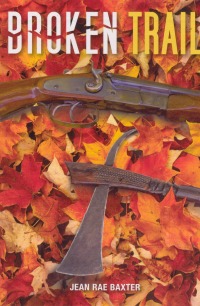| ________________
CM . . .
. Volume XVII Number 26. . . .March 11, 2011 
 |
Broken Trail.
Jean Rae Baxter.
Vancouver, BC: Ronsdale Press, 2011.
238 pp., pbk., $11.95.
ISBN 978-1-55380-109-2.
Grades 5-11 / Ages 10-16.
Review by Ruth Latta.
*** /4
|
| |
|

excerpt:
...Broken Trail sat facing his uncle on the ground outside the Bear Clan longhouse. Carries-a-Quiver was a man of fifty winters... He appeared to be studying the arrowhead but Broken Trail knew that his uncle's mind was really on him.
"When you disappeared, some people thought you had returned to your white family," Carries-a-Quiver said. "They believed that your heart had remained with them all along."
Broken Trail looked down, feeling guilty to have deceived his uncle, for he knew how much truth there was in this.
...
"He was not, as he had sometimes feared, stranded in a no man's land between two worlds. Nor was he forced to choose one world or the other. Instead, he could be a bridge to connect them."
Broken Trail, set in 1780, is a coming-of-age novel about a 13-year-old boy from New York, one of the Thirteen Colonies at war with Britain. Moses Cobham was kidnapped at age nine by Oneida people when his family was camped at Oneida Lake on their way to Upper Canada. Anti-royalist neighbours torched their home while Moses's father and elder brother, Elijah, were away, serving the king with Butler's Rangers.
The novel begins with the renamed Moses, now "Broken Trail," learning the initiation skills required to become a warrior in the culture which adopted him. He is happy as an Oneida. In the longhouse at night, he has seen his mother "looking at him with a look of love" that made him "close his eyes to shut it out, knowing himself unworthy of such devotion."
While in the forest on a vision quest, Broken Trail is shot in the leg by two Redcoat soldiers. At camp, the captain decides that this "white Indian" would make the ideal courier to travel some 500 miles in 12 days to warn the British officer, Major Patrick Ferguson, [a real person] in North Carolina that an attack against him is looming.
Broken Trail's journey, both geographic and personal, makes for a fast-paced interesting novel structured according to the Hero's Journey pattern. Baxter's narration, with cliffhangers at the end of chapters, will appeal to young people reading to see what happens next. Yet the plot device that leads to Broken Trail's journey seems contrived. In 1780, would a British army captain stationed in the Lake Ontario/St. Lawrence River area of Upper Canada be likely to receive intelligence about movements against British forces deep in North Carolina? More likely, this information would have been relayed to Lord Cornwallis, Major Ferguson's superior officer, who was in Charlotte, North Carolina, and in a position to help Ferguson.
Historical novels should entertain, and Baxter excels in keeping her central character moving through the woodlands from one challenge to another. An added function of an historical novel is to inform. The author must balance the need to create a fast-paced, interesting story with the need for accuracy and atmosphere.
A preface explaining the politics of the time would be useful to young readers who may have encountered the word "rebel" in an American Civil War context. "Loyalist" and "rebel," as used in Broken Trail, could have been defined. Indeed, those who were "rebels" to their enemies were "Patriots" among their friends. The terms "Yankee" and "Whig" were in common parlance, also, before "American" came into common usage.
In North Carolina, Broken Trail meets a Cherokee who has been fighting white settlers and who says that the English are friends of his nation. In a preface, Baxter could have noted the British Proclamation of 1763 forbidding white settlers from the Thirteen Colonies to cross the crest of the Appalachian Mountains to settle in the "Indian territory" beyond. Settlers from the Carolinas, Virginia and Tennessee wanted people of European origin to be able to spread across the continent. The "Overlanders" who fought against Major Ferguson were settlers who had already crossed the mountains.
King's Mountain is a rocky, forested hill in the upper Piedmont near the border between the Carolinas. There, local "Patriot" militias, along with "Overlanders," took by surprise the Loyalist militias and soldiers under Major Ferguson. Ferguson's defeat caused British commander Lord Cornwallis to cancel his plans to invade North Carolina. The Battle of King's Mountain is an historic site because the battle was a turning point toward American victory.
The battle part of Baxter's story is particularly compelling, as is Broken Trail's rescue of his brother. Soon Broken Trail is on the homeward journey where more challenges and a final test await him.
Broken Trail is the second novel in Baxter's Loyalist trilogy. The first, This Way Lies North, was published in 2007. Will Broken Trail appear in Number Three? We must wait and see.
Recommended.
Ruth Latta's most recently published work is a collection of short stories, Winter Moon (Ottawa, Baico, 2010, $16.95).

To comment
on this title or this review, send mail to cm@umanitoba.ca.
Copyright © the Manitoba Library Association. Reproduction for personal
use is permitted only if this copyright notice is maintained. Any
other reproduction is prohibited without permission.
NEXT REVIEW |
TABLE OF CONTENTS FOR THIS ISSUE
- March 11, 2011.
AUTHORS |
TITLES |
MEDIA REVIEWS |
PROFILES |
BACK ISSUES |
SEARCH |
CMARCHIVE |
HOME |
